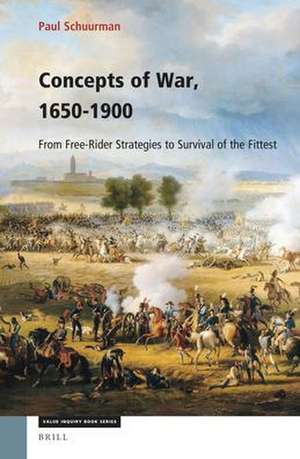Concepts of War, 1650-1900: From Free-Rider Strategies to Survival of the Fittest: Value Inquiry Book Series / Studies in the History of Western Philosophy, cartea 383
Autor Paul Schuurmanen Limba Engleză Hardback – 23 feb 2023
Preț: 753.78 lei
Preț vechi: 919.25 lei
-18% Nou
Puncte Express: 1131
Preț estimativ în valută:
144.24€ • 150.97$ • 120.05£
144.24€ • 150.97$ • 120.05£
Carte indisponibilă temporar
Doresc să fiu notificat când acest titlu va fi disponibil:
Se trimite...
Preluare comenzi: 021 569.72.76
Specificații
ISBN-13: 9789004536661
ISBN-10: 9004536663
Dimensiuni: 155 x 235 mm
Greutate: 0 kg
Editura: Brill
Colecția Brill
Seria Value Inquiry Book Series / Studies in the History of Western Philosophy
ISBN-10: 9004536663
Dimensiuni: 155 x 235 mm
Greutate: 0 kg
Editura: Brill
Colecția Brill
Seria Value Inquiry Book Series / Studies in the History of Western Philosophy
Notă biografică
Paul Schuurman was associate professor at the philosophy department of Erasmus University Rotterdam until his retirement. He has published articles on war in the history of ideas and on early modern philosophy. His books include Ideas, Mental Faculties and Method: The New Logic of René Descartes and John Locke and Its Reception in the Dutch Republic, 1630-1750 (Brill, 2004) and (co-edited with Sami-Juhani Savonius-Wroth and Jonathan Walmsley) The Bloomsbury Companion to Locke (Bloomsbury, 2014).
Cuprins
Preface
List of Figures and Tables
Introduction
1The Cat’s Grand Strategy Pieter de la Court on Holland and the Challenges and Prospects of Free-Riding Behaviour during the General Crisis of the Seventeenth Century
1 Introduction
2 Commerce and Compromise
3 Historical Context: Change and Crisis
4 Game Theory
5 Holland and Europe: the Opportunities of Free-Riding
6 Holland and the Other United Provinces: the Challenges of Free-Riding
7 Philosophical Context: Hobbes and Spinoza
8 Conclusion
2François Fénelon on Luxury, War, and Trade in the Telemachus
1 Introduction
2 Telemachus
3 Boetica
4 Salentum: Luxury and War
5 Salentum: Commerce
6 Mercantilism
7 Quietism
8 Self-interest
9 Evaluation
3‘The Effect in Turn Became the Cause’ Determinism and Causal Feedback Loops in Montesquieu’s Explanations for the Military Rise and Fall of Rome
1 Introduction
2 Determinism and Contingency at the Meso-Level
3 Process Explanations
4 Military and Political Context
5 Philosophical and Historiographical Context
4Carl von Clausewitz on Limited War: a Three-Stage Interpretation
1 Introduction
2 Interaction and Holism
3 Friction
4 Suspension
5 Politics
6 Discussion
5What-If at Waterloo: Clausewitz’s Use of Historical Counterfactuals in his History of the Campaign of 1815
1 Introduction
2 Description: the Waterloo Campaign in 25 Counterfactuals
3 Analysis of the Function of Counterfactuals in the ‘Campaign of 1815’
4 Context: On War
5 Context: Military History in General
6Models of War 1770–1830: the Birth of Wargames and the Trade-Off between Realism and Simplicity
1 Introduction
2 Wargames 1770–1830: Types and Functions
3 Historical Background: Peace and War and Peace
4 Trade-Off between Realism and Simplicity
5 The Realism-Simplicity Trade-Off and Chance
6 Discussion: Empire of Chance?
7 Conclusion
7Preparing for War: Prussian–German Professional Wargames and the Leadership Concept of Mission Tactics 1870–1880
1 Introduction
2 Prussian–German Wargames 1870–1880
3 Wargames and Mission Tactics
4 Wargames and Mission Tactics: Incubation, Rifles, and Railways
5 Conclusion
8Herbert Spencer and the Paradox of War
1 Introduction
2 The Function of War: before Spencer
3 Spencer on the Function of War
4 Biological Evolution: Two Mechanisms
5 Evolution of the Militant and the Industrial Type: the Same Two Mechanisms
6 The Function of the Militant/Industrial Typology
7 Evaluation
Bibliography
Index
List of Figures and Tables
Introduction
1The Cat’s Grand Strategy Pieter de la Court on Holland and the Challenges and Prospects of Free-Riding Behaviour during the General Crisis of the Seventeenth Century
1 Introduction
2 Commerce and Compromise
3 Historical Context: Change and Crisis
4 Game Theory
5 Holland and Europe: the Opportunities of Free-Riding
6 Holland and the Other United Provinces: the Challenges of Free-Riding
7 Philosophical Context: Hobbes and Spinoza
8 Conclusion
2François Fénelon on Luxury, War, and Trade in the Telemachus
1 Introduction
2 Telemachus
3 Boetica
4 Salentum: Luxury and War
5 Salentum: Commerce
6 Mercantilism
7 Quietism
8 Self-interest
9 Evaluation
3‘The Effect in Turn Became the Cause’ Determinism and Causal Feedback Loops in Montesquieu’s Explanations for the Military Rise and Fall of Rome
1 Introduction
2 Determinism and Contingency at the Meso-Level
3 Process Explanations
4 Military and Political Context
5 Philosophical and Historiographical Context
4Carl von Clausewitz on Limited War: a Three-Stage Interpretation
1 Introduction
2 Interaction and Holism
3 Friction
4 Suspension
5 Politics
6 Discussion
5What-If at Waterloo: Clausewitz’s Use of Historical Counterfactuals in his History of the Campaign of 1815
1 Introduction
2 Description: the Waterloo Campaign in 25 Counterfactuals
3 Analysis of the Function of Counterfactuals in the ‘Campaign of 1815’
4 Context: On War
5 Context: Military History in General
6Models of War 1770–1830: the Birth of Wargames and the Trade-Off between Realism and Simplicity
1 Introduction
2 Wargames 1770–1830: Types and Functions
3 Historical Background: Peace and War and Peace
4 Trade-Off between Realism and Simplicity
5 The Realism-Simplicity Trade-Off and Chance
6 Discussion: Empire of Chance?
7 Conclusion
7Preparing for War: Prussian–German Professional Wargames and the Leadership Concept of Mission Tactics 1870–1880
1 Introduction
2 Prussian–German Wargames 1870–1880
3 Wargames and Mission Tactics
4 Wargames and Mission Tactics: Incubation, Rifles, and Railways
5 Conclusion
8Herbert Spencer and the Paradox of War
1 Introduction
2 The Function of War: before Spencer
3 Spencer on the Function of War
4 Biological Evolution: Two Mechanisms
5 Evolution of the Militant and the Industrial Type: the Same Two Mechanisms
6 The Function of the Militant/Industrial Typology
7 Evaluation
Bibliography
Index




